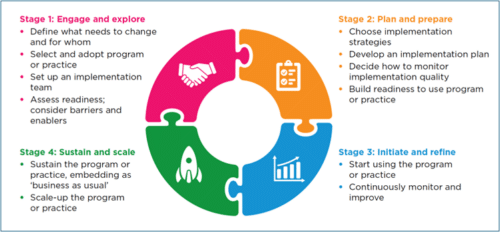News
For years, the Nuffield Foundation and the Sutton Trust have supported early years programmes that improve children’s outcomes and the quality of early learning. However, implementation remains a challenge, particularly considering the current difficulties faced by early years providers.
This was the focus of a recent discussion hosted by the Sutton Trust and the Nuffield Foundation, which brought together educators, programme developers, researchers, funders, and policymakers to explore effective approaches to implementation.
Here, Laura Barbour, Early Years Lead at the Sutton Trust and Eleanor Ireland, Education Programme Head at the Nuffield Foundation share their thoughts from the day.
Laura Barbour’s key takeaways:
The importance of ‘keeping why at the heart’ to support effective implementation
The Sutton Trust champions the early years as a vital period for social mobility, and recognises that quality early education is a key driver in improving child outcomes and addressing socio-economic gaps before the start of school. A skilled workforce, developed through pre-service training and continuing professional development (CPD), is essential for quality early education provision.
Supporting children’s communication and language is crucial for good pedagogy and addressing intergenerational poverty. To achieve this, we must ensure these programmes are well-implemented.
Translating effective interventions into everyday practice
In recent years there has been significant investment in strengthening the evidence base of interventions to support good practice within early years settings. Discussions during the event surfaced a key point; good implementation is critical to achieving the desired outcomes of evidence-based interventions. There is even some evidence that good implementation of less effective interventions can yield better outcomes than poor implementation of more effective ones.
Tailored support, coaching and expert advice are key enablers
The Sutton Trust’s Coaching Early Conversations Interaction and Language (CECIL) project found that appropriate support along with expert advice from professionals like speech and language therapists and early years teachers ensure effective implementation with good practice embedded and sustained.
The power of a sustainable system
Initiatives like Early Talk for York, Thrive at Five, Better Start and the DfE-funded Stronger Practice Hubs demonstrate the value of a holistic system in driving the implementation of good practice.
Eleanor Ireland’s key takeaways:
Supporting implementation should be at the core of intervention design
The Nuffield Foundation has long funded the evaluation of early years interventions. We know much more about what works, and it’s important for the research we fund in the future to also consider how these interventions can be effectively implemented. Encouraging applicants to include implementation and process evaluations in their projects will help us understand delivery mechanisms and identify successful and unsuccessful elements.
A panel member, Dr Sandra Mathers, introduced ‘principled adaptation’ – distinguishing between the core elements of an intervention, which are those that are essential to making it work, from those that can be adapted to local contexts.
Our keynote speaker Jane Lewis emphasised the importance of ensuring interventions are delivery-ready, so they are clear on what needs to be done, when and by whom.
The importance of time for implementation
Implementation takes time. Early years educators shared how they struggle when expected to frequently deliver new interventions. Adequate time must be allocated before and after programme delivery if interventions are to be successful.
Jane shared the different phases needed for successful implementation. Before an intervention takes place, it is crucial to explore the local context and pinpoint what needs to change and why. Identifying and addressing the barriers to delivery alongside the people and systems that might enable change are also vital pre-delivery steps.
Figure 1: Stages of implementation

Jane Lewis, Centre for Evidence and Implementation, Based on Aarons et al., 2011
Time should also be allowed after the initial delivery phase to ensure staff can gain confidence and become skilled in the programme. Considering the long-term sustainability of the intervention is also vital, as is ongoing monitoring, reflection, and improvement.
The EEF’s A School’s Guide to Implementation provides more detail on effective strategies for implementation.
Future research
The Nuffield Foundation continues to fund research on developing and evaluating interventions to improve children’s outcomes and their long-term implementation. For more information on our grants, click here.